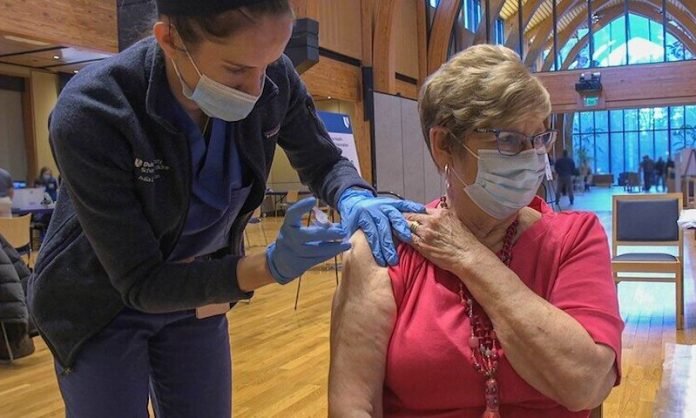
The COVID-19 vaccine will protect you and others from the virus and help us end this pandemic.
While people with medical conditions may be concerned about the vaccine, Duke Health experts said that having a medical condition can increase your risk of getting very sick if you are infected.
“One of the great things about these vaccines is that they can be used in a wide variety of individuals,” said Kenneth Schmader, MD, a geriatric disease specialist at Duke.
He and other Duke experts explained why the benefits of getting vaccinated most often outweigh the risks of getting sick.
Understanding the Allergy Connection
The main concern about the COVID-19 vaccines has been among people with a severe allergic reaction to polyethylene glycol (PEG) or polysorbate, said Dr. Schmader.
These ingredients are similar but not identical to components in the currently approved COVID-19 vaccines. The CDC recommends that people with this allergy not get the vaccine.
Similarly, the CDC recommends that people not receive the second dose if they had a severe allergic reaction following the first dose.
The incidence of this occurring is low, said Dr. Schmader, about one in six per million doses. “If someone had an anaphylactic reaction, they should not get the second dose,” he said.
If You Have Medication, Pet, Environmental Allergies
You can get the COVID-19 vaccine if you experience allergic reactions to injectable medicines, antibiotics, pets, environmental substances, or foods, said Dr. Schmader.
People who have egg allergies may be concerned because some vaccines for flu, measles, and other diseases contain a small amount of egg protein.
“COVID-19 vaccines do not contain egg protein, so there is no concern,” explained Jennifer Saullo, MD, an infectious disease specialist at Duke Health.
If you have questions, talk to your doctor. They will conduct a risk assessment to determine whether the benefits of the vaccine outweigh the risks.
If You Have Cancer
The COVID-19 vaccine is recommended for people who are actively being treated for cancer, said Dr. Saullo. “There is no reason to think the vaccine is unsafe for patients with cancer,” she said.
In fact, people with cancer are more susceptible to serious COVID-19 illness. That’s why they are listed among the first groups to receive the vaccine.
Because cancer patients in active treatment were not part of the clinical trials, the vaccine’s effectiveness in this patient population is still unknown.
“Having a vaccine that is somewhat effective is better than no vaccine at all,” she said. Talk to your doctor about when to schedule the vaccine so that it coincides with your treatment.
That advice is especially important for recent bone marrow transplant recipients. “We know they won’t respond well to the vaccine, so they may have to wait several months,” Dr. Saullo said.
It’s very important that caregivers and people who surround these and other cancer patients are vaccinated so they can protect their sick loved ones.
If You Are Pregnant
The COVID-19 vaccine is recommended for pregnant women, a group in which the risk of severe COVID-19 is substantial, Dr. Schmader said.
We encourage all pregnant people to ask questions and discuss their concerns with their providers. The risk of a bad reaction from the vaccine is low.
“The benefit of getting the vaccine is high.” To date, pregnant health care workers who received the vaccine are doing well.
The Vaccine Is Being Studied in Children Now
While children were not part of the clinical trials for the approved COVID-19 vaccines, studies are underway to determine if they are safe and effective for young children.
“We know there are children with chronic medical conditions who are at increased risk for serious illness from COVID-19,” Dr. Schmader said.
“Vaccinating children is important.” However, children are not small adults. “We need the data before we move forward,” he said.
The Vaccine Will Help Fight This Pandemic
The weeks following the winter holidays have seen a surge in sick people at doctor’s offices, urgent care, and respiratory care centers throughout Duke, said Ann Dorsey, MD, regional medical director of Duke Urgent Care centers in Durham and Orange counties.
Many are well enough to recover safely at home; however, some need additional care if their symptoms worsen.
The only way to stem the surge is through vaccination. “The idea of herd immunity is that a large proportion of the population becomes immune by vaccination or by infection,” said Dr. Saullo.
There’s still uncertainty about what percentage of the population needs to be considered immune to reach herd immunity, but “we will know more about what is required as we learn more about the vaccine.”
The goal now is to vaccinate as many people as possible and to follow state and federal guidelines to ensure the vaccine is given safely and equitably.
Rick Shannon, MD, Duke Health’s Chief Quality Officer, said the health system is working with the state to ramp up the capability to get the vaccine to more people faster.
Continue Practicing Safety Precautions
In the meantime, and even after you are vaccinated, it’s important to continue to follow the safety precautions that have worked to limit the spread so far:
Wear a mask
Practice social distancing
Wash your hands frequently
Stay home if you are sick



